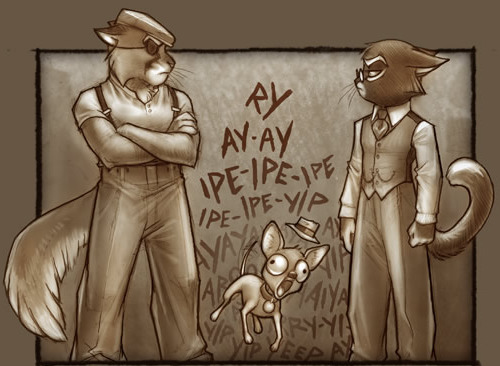#Computer Repairing
Explore tagged Tumblr posts
Text

were getting into cross stitch
#monty tag#my computer died this morning so this is what im doing til it can be repaired this arvo#2024 going out with a whimper
1K notes
·
View notes
Text
Autoenshittification

Forget F1: the only car race that matters now is the race to turn your car into a digital extraction machine, a high-speed inkjet printer on wheels, stealing your private data as it picks your pocket. Your car’s digital infrastructure is a costly, dangerous nightmare — but for automakers in pursuit of postcapitalist utopia, it’s a dream they can’t give up on.
Your car is stuffed full of microchips, a fact the world came to appreciate after the pandemic struck and auto production ground to a halt due to chip shortages. Of course, that wasn’t the whole story: when the pandemic started, the automakers panicked and canceled their chip orders, only to immediately regret that decision and place new orders.
But it was too late: semiconductor production had taken a serious body-blow, and when Big Car placed its new chip orders, it went to the back of a long, slow-moving line. It was a catastrophic bungle: microchips are so integral to car production that a car is basically a computer network on wheels that you stick your fragile human body into and pray.
The car manufacturers got so desperate for chips that they started buying up washing machines for the microchips in them, extracting the chips and discarding the washing machines like some absurdo-dystopian cyberpunk walnut-shelling machine:
https://www.autoevolution.com/news/desperate-times-companies-buy-washing-machines-just-to-rip-out-the-chips-187033.html
These digital systems are a huge problem for the car companies. They are the underlying cause of a precipitous decline in car quality. From touch-based digital door-locks to networked sensors and cameras, every digital system in your car is a source of endless repair nightmares, costly recalls and cybersecurity vulnerabilities:
https://www.reuters.com/business/autos-transportation/quality-new-vehicles-us-declining-more-tech-use-study-shows-2023-06-22/
What’s more, drivers hate all the digital bullshit, from the janky touchscreens to the shitty, wildly insecure apps. Digital systems are drivers’ most significant point of dissatisfaction with the automakers’ products:
https://www.theverge.com/23801545/car-infotainment-customer-satisifaction-survey-jd-power
Even the automakers sorta-kinda admit that this is a problem. Back in 2020 when Massachusetts was having a Right-to-Repair ballot initiative, Big Car ran these unfuckingbelievable scare ads that basically said, “Your car spies on you so comprehensively that giving anyone else access to its systems will let murderers stalk you to your home and kill you:
https://pluralistic.net/2020/09/03/rip-david-graeber/#rolling-surveillance-platforms
But even amid all the complaining about cars getting stuck in the Internet of Shit, there’s still not much discussion of why the car-makers are making their products less attractive, less reliable, less safe, and less resilient by stuffing them full of microchips. Are car execs just the latest generation of rubes who’ve been suckered by Silicon Valley bullshit and convinced that apps are a magic path to profitability?
Nope. Car execs are sophisticated businesspeople, and they’re surfing capitalism’s latest — and last — hot trend: dismantling capitalism itself.
Now, leftists have been predicting the death of capitalism since The Communist Manifesto, but even Marx and Engels warned us not to get too frisky: capitalism, they wrote, is endlessly creative, constantly reinventing itself, re-emerging from each crisis in a new form that is perfectly adapted to the post-crisis reality:
https://www.nytimes.com/2022/10/31/books/review/a-spectre-haunting-china-mieville.html
But capitalism has finally run out of gas. In his forthcoming book, Techno Feudalism: What Killed Capitalism, Yanis Varoufakis proposes that capitalism has died — but it wasn’t replaced by socialism. Rather, capitalism has given way to feudalism:
https://www.penguin.co.uk/books/451795/technofeudalism-by-varoufakis-yanis/9781847927279
Under capitalism, capital is the prime mover. The people who own and mobilize capital — the capitalists — organize the economy and take the lion’s share of its returns. But it wasn’t always this way: for hundreds of years, European civilization was dominated by rents, not markets.
A “rent” is income that you get from owning something that other people need to produce value. Think of renting out a house you own: not only do you get paid when someone pays you to live there, you also get the benefit of rising property values, which are the result of the work that all the other homeowners, business owners, and residents do to make the neighborhood more valuable.
The first capitalists hated rent. They wanted to replace the “passive income” that landowners got from taxing their serfs’ harvest with active income from enclosing those lands and grazing sheep in order to get wool to feed to the new textile mills. They wanted active income — and lots of it.
Capitalist philosophers railed against rent. The “free market” of Adam Smith wasn’t a market that was free from regulation — it was a market free from rents. The reason Smith railed against monopolists is because he (correctly) understood that once a monopoly emerged, it would become a chokepoint through which a rentier could cream off the profits he considered the capitalist’s due:
https://locusmag.com/2021/03/cory-doctorow-free-markets/
Today, we live in a rentier’s paradise. People don’t aspire to create value — they aspire to capture it. In Survival of the Richest, Doug Rushkoff calls this “going meta”: don’t provide a service, just figure out a way to interpose yourself between the provider and the customer:
https://pluralistic.net/2022/09/13/collapse-porn/#collapse-porn
Don’t drive a cab, create Uber and extract value from every driver and rider. Better still: don’t found Uber, invest in Uber options and extract value from the people who invest in Uber. Even better, invest in derivatives of Uber options and extract value from people extracting value from people investing in Uber, who extract value from drivers and riders. Go meta.
This is your brain on the four-hour-work-week, passive income mind-virus. In Techno Feudalism, Varoufakis deftly describes how the new “Cloud Capital” has created a new generation of rentiers, and how they have become the richest, most powerful people in human history.
Shopping at Amazon is like visiting a bustling city center full of stores — but each of those stores’ owners has to pay the majority of every sale to a feudal landlord, Emperor Jeff Bezos, who also decides which goods they can sell and where they must appear on the shelves. Amazon is full of capitalists, but it is not a capitalist enterprise. It’s a feudal one:
https://pluralistic.net/2022/11/28/enshittification/#relentless-payola
This is the reason that automakers are willing to enshittify their products so comprehensively: they were one of the first industries to decouple rents from profits. Recall that the reason that Big Car needed billions in bailouts in 2008 is that they’d reinvented themselves as loan-sharks who incidentally made cars, lending money to car-buyers and then “securitizing” the loans so they could be traded in the capital markets.
Even though this strategy brought the car companies to the brink of ruin, it paid off in the long run. The car makers got billions in public money, paid their execs massive bonuses, gave billions to shareholders in buybacks and dividends, smashed their unions, fucked their pensioned workers, and shipped jobs anywhere they could pollute and murder their workforce with impunity.
Car companies are on the forefront of postcapitalism, and they understand that digital is the key to rent-extraction. Remember when BMW announced that it was going to rent you the seatwarmer in your own fucking car?
https://pluralistic.net/2020/07/02/big-river/#beemers
Not to be outdone, Mercedes announced that they were going to rent you your car’s accelerator pedal, charging an extra $1200/year to unlock a fully functional acceleration curve:
https://www.theverge.com/2022/11/23/23474969/mercedes-car-subscription-faster-acceleration-feature-price
This is the urinary tract infection business model: without digitization, all your car’s value flowed in a healthy stream. But once the car-makers add semiconductors, each one of those features comes out in a painful, burning dribble, with every button on that fakakta touchscreen wired directly into your credit-card.
But it’s just for starters. Computers are malleable. The only computer we know how to make is the Turing Complete Von Neumann Machine, which can run every program we know how to write. Once they add networked computers to your car, the Car Lords can endlessly twiddle the knobs on the back end, finding new ways to extract value from you:
https://doctorow.medium.com/twiddler-1b5c9690cce6
That means that your car can track your every movement, and sell your location data to anyone and everyone, from marketers to bounty-hunters looking to collect fees for tracking down people who travel out of state for abortions to cops to foreign spies:
https://www.vice.com/en/article/n7enex/tool-shows-if-car-selling-data-privacy4cars-vehicle-privacy-report
Digitization supercharges financialization. It lets car-makers offer subprime auto-loans to desperate, poor people and then killswitch their cars if they miss a payment:
https://www.youtube.com/watch?v=4U2eDJnwz_s
Subprime lending for cars would be a terrible business without computers, but digitization makes it a great source of feudal rents. Car dealers can originate loans to people with teaser rates that quickly blow up into payments the dealer knows their customer can’t afford. Then they repo the car and sell it to another desperate person, and another, and another:
https://pluralistic.net/2022/07/27/boricua/#looking-for-the-joke-with-a-microscope
Digitization also opens up more exotic options. Some subprime cars have secondary control systems wired into their entertainment system: miss a payment and your car radio flips to full volume and bellows an unstoppable, unmutable stream of threats. Tesla does one better: your car will lock and immobilize itself, then blare its horn and back out of its parking spot when the repo man arrives:
https://tiremeetsroad.com/2021/03/18/tesla-allegedly-remotely-unlocks-model-3-owners-car-uses-smart-summon-to-help-repo-agent/
Digital feudalism hasn’t stopped innovating — it’s just stopped innovating good things. The digital device is an endless source of sadistic novelties, like the cellphones that disable your most-used app the first day you’re late on a payment, then work their way down the other apps you rely on for every day you’re late:
https://restofworld.org/2021/loans-that-hijack-your-phone-are-coming-to-india/
Usurers have always relied on this kind of imaginative intimidation. The loan-shark’s arm-breaker knows you’re never going to get off the hook; his goal is in intimidating you into paying his boss first, liquidating your house and your kid’s college fund and your wedding ring before you default and he throws you off a building.
Thanks to the malleability of computerized systems, digital arm-breakers have an endless array of options they can deploy to motivate you into paying them first, no matter what it costs you:
https://pluralistic.net/2021/04/02/innovation-unlocks-markets/#digital-arm-breakers
Car-makers are trailblazers in imaginative rent-extraction. Take VIN-locking: this is the practice of adding cheap microchips to engine components that communicate with the car’s overall network. After a new part is installed in your car, your car’s computer does a complex cryptographic handshake with the part that requires an unlock code provided by an authorized technician. If the code isn’t entered, the car refuses to use that part.
VIN-locking has exploded in popularity. It’s in your iPhone, preventing you from using refurb or third-party replacement parts:
https://doctorow.medium.com/apples-cement-overshoes-329856288d13
It’s in fuckin’ ventilators, which was a nightmare during lockdown as hospital techs nursed their precious ventilators along by swapping parts from dead systems into serviceable ones:
https://www.vice.com/en/article/3azv9b/why-repair-techs-are-hacking-ventilators-with-diy-dongles-from-poland
And of course, it’s in tractors, along with other forms of remote killswitch. Remember that feelgood story about John Deere bricking the looted Ukrainian tractors whose snitch-chips showed they’d been relocated to Russia?
https://doctorow.medium.com/about-those-kill-switched-ukrainian-tractors-bc93f471b9c8
That wasn’t a happy story — it was a cautionary tale. After all, John Deere now controls the majority of the world’s agricultural future, and they’ve boobytrapped those ubiquitous tractors with killswitches that can be activated by anyone who hacks, takes over, or suborns Deere or its dealerships.
Control over repair isn’t limited to gouging customers on parts and service. When a company gets to decide whether your device can be fixed, it can fuck you over in all kinds of ways. Back in 2019, Tim Apple told his shareholders to expect lower revenues because people were opting to fix their phones rather than replace them:
https://www.apple.com/newsroom/2019/01/letter-from-tim-cook-to-apple-investors/
By usurping your right to decide who fixes your phone, Apple gets to decide whether you can fix it, or whether you must replace it. Problem solved — and not just for Apple, but for car makers, tractor makers, ventilator makers and more. Apple leads on this, even ahead of Big Car, pioneering a “recycling” program that sees trade-in phones shredded so they can’t possibly be diverted from an e-waste dump and mined for parts:
https://www.vice.com/en/article/yp73jw/apple-recycling-iphones-macbooks
John Deere isn’t sleeping on this. They’ve come up with a valuable treasure they extract when they win the Right-to-Repair: Deere singles out farmers who complain about its policies and refuses to repair their tractors, stranding them with six-figure, two-ton paperweight:
https://pluralistic.net/2022/05/31/dealers-choice/#be-a-shame-if-something-were-to-happen-to-it
The repair wars are just a skirmish in a vast, invisible fight that’s been waged for decades: the War On General-Purpose Computing, where tech companies use the law to make it illegal for you to reconfigure your devices so they serve you, rather than their shareholders:
https://memex.craphound.com/2012/01/10/lockdown-the-coming-war-on-general-purpose-computing/
The force behind this army is vast and grows larger every day. General purpose computers are antithetical to technofeudalism — all the rents extracted by technofeudalists would go away if others (tinkereres, co-ops, even capitalists!) were allowed to reconfigure our devices so they serve us.
You’ve probably noticed the skirmishes with inkjet printer makers, who can only force you to buy their ink at 20,000% markups if they can stop you from deciding how your printer is configured:
https://pluralistic.net/2022/08/07/inky-wretches/#epson-salty But we’re also fighting against insulin pump makers, who want to turn people with diabetes into walking inkjet printers:
https://pluralistic.net/2022/06/10/loopers/#hp-ification
And companies that make powered wheelchairs:
https://pluralistic.net/2022/06/08/chair-ish/#r2r
These companies start with people who have the least agency and social power and wreck their lives, then work their way up the privilege gradient, coming for everyone else. It’s called the “shitty technology adoption curve”:
https://pluralistic.net/2022/08/21/great-taylors-ghost/#solidarity-or-bust
Technofeudalism is the public-private-partnership from hell, emerging from a combination of state and private action. On the one hand, bailing out bankers and big business (rather than workers) after the 2008 crash and the covid lockdown decoupled income from profits. Companies spent billions more than they earned were still wildly profitable, thanks to those public funds.
But there’s also a policy dimension here. Some of those rentiers’ billions were mobilized to both deconstruct antitrust law (allowing bigger and bigger companies and cartels) and to expand “IP” law, turning “IP” into a toolsuite for controlling the conduct of a firm’s competitors, critics and customers:
https://locusmag.com/2020/09/cory-doctorow-ip/
IP is key to understanding the rise of technofeudalism. The same malleability that allows companies to “twiddle” the knobs on their services and keep us on the hook as they reel us in would hypothetically allow us to countertwiddle, seizing the means of computation:
https://pluralistic.net/2023/04/12/algorithmic-wage-discrimination/#fishers-of-men
The thing that stands between you and an alternative app store, an interoperable social media network that you can escape to while continuing to message the friends you left behind, or a car that anyone can fix or unlock features for is IP, not technology. Under capitalism, that technology would already exist, because capitalists have no loyalty to one another and view each other’s margins as their own opportunities.
But under technofeudalism, control comes from rents (owning things), not profits (selling things). The capitalist who wants to participate in your iPhone’s “ecosystem” has to make apps and submit them to Apple, along with 30% of their lifetime revenues — they don’t get to sell you jailbreaking kit that lets you choose their app store.
Rent-seeking technology has a holy grail: control over “ring zero” — the ability to compel you to configure your computer to a feudalist’s specifications, and to verify that you haven’t altered your computer after it came into your possession:
https://pluralistic.net/2022/01/30/ring-minus-one/#drm-political-economy
For more than two decades, various would-be feudal lords and their court sorcerers have been pitching ways of doing this, of varying degrees of outlandishness.
At core, here’s what they envision: inside your computer, they will nest another computer, one that is designed to run a very simple set of programs, none of which can be altered once it leaves the factory. This computer — either a whole separate chip called a “Trusted Platform Module” or a region of your main processor called a secure enclave — can tally observations about your computer: which operating system, modules and programs it’s running.
Then it can cryptographically “sign” these observations, proving that they were made by a secure chip and not by something you could have modified. Then you can send this signed “attestation” to someone else, who can use it to determine how your computer is configured and thus whether to trust it. This is called “remote attestation.”
There are some cool things you can do with remote attestation: for example, two strangers playing a networked video game together can use attestations to make sure neither is running any cheat modules. Or you could require your cloud computing provider to use attestations that they aren’t stealing your data from the server you’re renting. Or if you suspect that your computer has been infected with malware, you can connect to someone else and send them an attestation that they can use to figure out whether you should trust it.
Today, there’s a cool remote attestation technology called “PrivacyPass” that replaces CAPTCHAs by having you prove to your own device that you are a human. When a server wants to make sure you’re a person, it sends a random number to your device, which signs that number along with its promise that it is acting on behalf of a human being, and sends it back. CAPTCHAs are all kinds of bad — bad for accessibility and privacy — and this is really great.
But the billions that have been thrown at remote attestation over the decades is only incidentally about solving CAPTCHAs or verifying your cloud server. The holy grail here is being able to make sure that you’re not running an ad-blocker. It’s being able to remotely verify that you haven’t disabled the bossware your employer requires. It’s the power to block someone from opening an Office365 doc with LibreOffice. It’s your boss’s ability to ensure that you haven’t modified your messaging client to disable disappearing messages before he sends you an auto-destructing memo ordering you to break the law.
And there’s a new remote attestation technology making the rounds: Google’s Web Environment Integrity, which will leverage Google’s dominance over browsers to allow websites to block users who run ad-blockers:
https://github.com/RupertBenWiser/Web-Environment-Integrity
There’s plenty else WEI can do (it would make detecting ad-fraud much easier), but for every legitimate use, there are a hundred ways this could be abused. It’s a technology purpose-built to allow rent extraction by stripping us of our right to technological self-determination.
Releasing a technology like this into a world where companies are willing to make their products less reliable, less attractive, less safe and less resilient in pursuit of rents is incredibly reckless and shortsighted. You want unauthorized bread? This is how you get Unauthorized Bread:
https://arstechnica.com/gaming/2020/01/unauthorized-bread-a-near-future-tale-of-refugees-and-sinister-iot-appliances/amp/

If you'd like an essay-formatted version of this thread to read or share, here's a link to it on pluralistic.net, my surveillance-free, ad-free, tracker-free blog:
https://pluralistic.net/2023/07/24/rent-to-pwn/#kitt-is-a-demon

[Image ID: The interior of a luxury car. There is a dagger protruding from the steering wheel. The entertainment console has been replaced by the text 'You wouldn't download a car,' in MPAA scare-ad font. Outside of the windscreen looms the Matrix waterfall effect. Visible in the rear- and side-view mirror is the driver: the figure from Munch's 'Scream.' The screen behind the steering-wheel has been replaced by the menacing red eye of HAL9000 from Stanley Kubrick's '2001: A Space Odyssey.']

Image: Cryteria (modified) https://commons.wikimedia.org/wiki/File:HAL9000.svg
CC BY 3.0 https://creativecommons.org/licenses/by/3.0/deed.en
#pluralistic#shitty technology adoption curve#unauthorized bread#automotive#arm-breakers#cars#big car#right to repair#rent-seeking#digital feudalism#neofeudalism#drm#wei#remote attestation#private access tokens#yannis varoufakis#web environment integrity#paternalism#war on general purpose computing#competitive compatibility#google#enshittification#interoperability#adversarial interoperability#comcom#the internet con#postcapitalism#ring zero#care#med-tech
4K notes
·
View notes
Text
Ace Attorney character named De Killer… I mean, I just feel like if we’re going to point fingers then that’s a good starting place
#ace attorney spoilers#this is what I meant when I said that Tracey Sketchit is an AA name#AA#thank you all for sitting through the AAposting.#I don’t have my computer for various projects right now so I’ve just been catching up on this game.#hopefully it should be repaired tomorrow???#also. pleased to say that the circus case wasn’t that bad!#I liked it more than the steel samurai one honestly#but I do see what y’all were talking about. I do have… a couple gripes with it but oh well#it was fine overall#but definitely near the bottom
79 notes
·
View notes
Text


yeah great job MSI I bet you're so proud of your chip obfuscation technique that I had to break out a pointy stick to defeat. Waste of my goddamn time.
Bad UEFI seems to have killed my old laptop, this flash chip clip is dog shit so it took me like fifty tries to get a clean read. Hopefully it writes fine, fortunately MSI just publishes the raw flash images at least, so I don't have to dig around in some fucked up exe.

76 notes
·
View notes
Text





to see me again. after so many years
#doctor who#dwedit#dwgifs#timelordgifs#usermills#userauden#userlyddy#doctorwhoedit#classic who#classic doctor who#toymaker#black guardian#white guardian#vislor turlough#14th doctor#first gifs in uh *looks at notes* five months!#computer is repaired
342 notes
·
View notes
Text
When did we make Zane a tech guy. Seriously. When did we decide Zane in particular would be good at tech. That's so stupid. We've got too many goddamn tech people in this show. Obviously everyone on the team has some degree of tech knowledge considering how often they might have to repair something in their line of work, but labeling Zane as one of "the tech guys" has never sat right with me. Let Jay, Nya and Pixal do their thing. And Sora.
#Zane should be almost useless when it comes to tech other than his own brain#and even then he couldn't do repairs on himself#he can just do things like download data and fuck with his voice and repress his memories#which is like. basic computer knowledge anyone could have.#in a sense. you get what I mean.#it makes complete sense for him to lose that one challenge in the Zane-a-like competition#ninjago#dragons rising#zane#zane julien
210 notes
·
View notes
Text
RIP to those who made the fatal mistake of crossing paths with Viktor and Mordecai's situationship
Sniffles


Poor Shmuck


The only pet dog in the Lackadaisy universe


Honorable mentions
Assorted goons





Defiance General Store owners skull integrity

#sorry for the lack of NEW posts i just got my computer back from repairs so been stuck reposting old posts#will be posting FRESH rambles#Vikdecai and hopefully more serious character analysis#this wil be good or bad news depending on your opinion on my nonsense#lackadaisy#lackadaisycats#vikdecai#tracy j butler#mordecai heller#viktor vasko#mordecai x viktor#sniffles#poor shmuck#defiance store owner#situationship#*Dreamy sigh* what is WRONG with them?
321 notes
·
View notes
Text
you never realize how much you use a letter until you suddenly can't anymore
#the letter 't' on my laptop keyboard has stopped working :(#and no computer repair places will be able to help until next week :(
27 notes
·
View notes
Text

Repairing his run-down laptop, the grad student is tempted to obliterate the anxiety-ridden piece of junk instead.
#LEGO#phd#phd life#grad school#grad school problems#grad student#grad student problems#grad life#graduate school#tech#technology#laptop#computer#run-down#repair#junk#hitting it might help#did you try restarting#can i restart my life instead
1K notes
·
View notes
Text

inspired by this thing, i needed to make my own terrible loop plushie. they are blue because i like blue
they're made of two other plushes i found at goodwill and harvested fabric from. we honor their sacrifice.
#dogyolk#art#isat loop#in stars and time#isat#sewing#crafts#i hand sewed them in a three day long haze while waiting for a computer repair man to tell me my harddrive was fried#my hands did Not work after i finished lmao#this was my first time making up patterns (for the spikes) and the way i did it was very jank but it worked out well !#i love my little freak#they live on my bed now#i may get around to making a more “accurate” loop plush someday#i.e. black and bipedal#i have the materials i just need a break
110 notes
·
View notes
Text

Hey everyone! Last weekend my cat accidentally knocked a drink onto my laptop, destroying half the keyboard and the ports on an elderly machine that already had issues.
I am asking for your patience and understanding while I deal with this for any delays and disruptions in store order fulfillment, responding to emails/messages, getting the TCAF debut stock up in my store, and posting art online; as my laptop was integral to all that.
If you were interested in Werewolf’s Lament or the medieval manuscript riso stickers please keep an eye on my social media for updates on their availability—unfortunately this is going to be a “replace” rather than “repair” situation and is a big, unexpected but necessary expense for me.
#please refrain from unsolicited computer advice and trust me when I say this thing is beyond repair#I was hoping to get another year or two out of that machine but kitty said NO
135 notes
·
View notes
Text




Slots for tarot style artwork are available again!
All characters and couples are welcome! Submissions are open until this Saturday (12/16) at 5pm CST. Spread the word! 🥰
#my main computer is being repaired and my laptop cant function on 4gb ram so hello from mobile !#my art#commissions#i sent out the mailing list god willing it worked this time
225 notes
·
View notes
Text

#touhou project#i have good friends#i couldnt make the shitpost myself as my computer is in for repairs#so they made it for me#saki kurokoma#yachie kicchou#cirno
34 notes
·
View notes
Text
are you guys tired yet of me constantly reposting pics of my DA trinket/art shelves every time i rearrange them. because guess what i have done Once Again
#i cant buy new things bc AAAHHHGGGG COMPUTER REPAIR EXPENSIVE 😭😭😭#but i did dig out some things i almost forgot about. plus added in the ardent blossom zine stuff#ramblings
19 notes
·
View notes
Text




mspaint drawings done on my school laptop while my main one was getting fixed up
freaks in the last two pics are the dnd characters of some of my friends. you know who you are. other two are my own ocs its an original character extravaganza
#aves art#aves ocs#dnd oc art#dnd oc#oc art#original character art#computer has since been repaired and returned to me thankfully#wasnt horrible messing around on mspaint though. did you know the latest version has layers
21 notes
·
View notes
Text
On Repairing what Broke too Soon
In 2010 I bought my first wireless mouse, the Logitech LX8 Cordless. It was perhaps not the best, but it was a solid, weighty mouse that lasted well over ten years before it started showing any issues. When it finally wore out I was happy to see what looked to be a newer version of the same, the Logitech M510.
It was not the same. It was the same overall size, shape, and layout, but rather than being any kind of an improvement, it was just cheaper all around.
In a matter of months, the left mouse button switch had already worn out. So I swapped the left & right switches, and ordered some new ones from Mouser.
Well that second switch wore out and the first had gotten significantly worse, so it was time to install those replacements.

The original Kailh switches just couldn't stand up to moderate use. Here's hoping the new Phillips switches I installed will hold up better.
19 notes
·
View notes